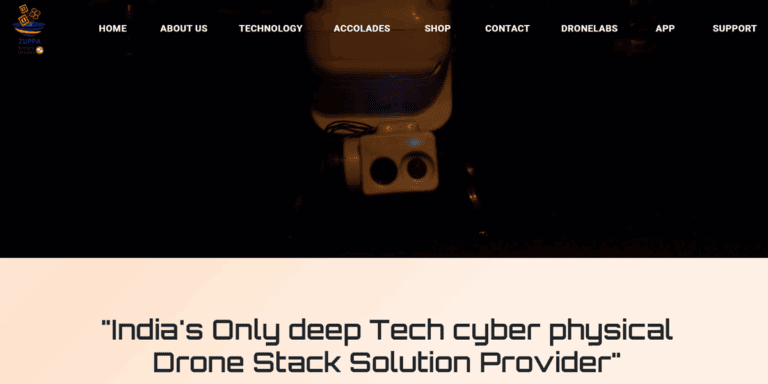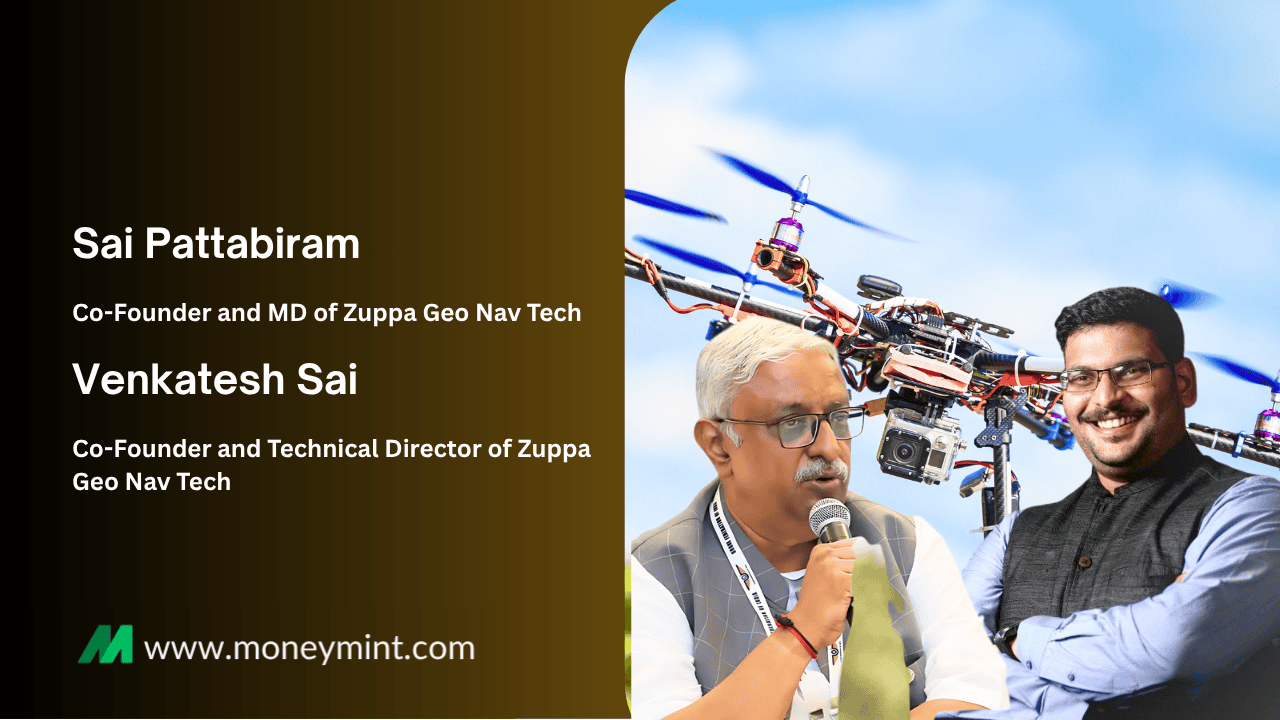While most people were still figuring out how to fly paper planes, a father-son duo in Chennai was quietly building drones that could fly without GPS, survive low-connectivity zones, and outsmart legacy systems in defense missions.
Welcome to the world of Zuppa Geo Navigation Technologies Pvt. Ltd., where drone tech isn’t just cool, it’s tactical, indigenous, and borderline genius.
Founded in 2008 by Sai Pattabiram and Venkatesh Sai, Zuppa is now leading India’s drone revolution with patented flight control systems, AI-powered navigation, and cyber-physical infrastructure that screams “Made in India, but built for the world.”
And yes, they just raised $1.5 million in bridge funding. Let’s unpack how they got here.
Meet the Founders: The OGs of Indian Drone Tech
Sai Pattabiram
With an MBA from Symbiosis International University and over four decades of experience in aerospace, composites, and defense, Sai is the kind of founder who doesn’t just talk innovation, he builds it. Before Zuppa, he worked across steel, electronics, and manufacturing, eventually diving deep into autonomous navigation platforms.
He’s also the mastermind behind Zuppa’s patented Disseminated Parallel Control Computing (DPCC) architecture, a real-time computing system that mimics how the human brain processes data. He made drones smarter than your average smartphone.
Venkatesh Sai
Started flying remote-controlled aero models at age 10. Won IIT Mumbai’s Techfest in 9th grade. Built India’s first electric aeromodelling hobby shop. Developed a backpack UAV for NAL by age 15. And at 20, created Zuppa’s patented autopilot system.
Venkatesh is now Zuppa’s Technical Director and the guy who makes sure their drones don’t just fly, they dominate.
What Makes Zuppa So Different?
Zuppa isn’t just assembling drones from imported parts. They’re building motherboards, autopilot systems, and AI stacks from scratch. That’s like designing your engine instead of buying one off the shelf.
Here’s what sets them apart:
- DPCC Architecture: Real-time computing that enables autonomous flight in GPS-denied zones
- NavGati Autopilot: Dual-core processors, redundant IMUs, and precision sensors
- Ajeet Mini Drone: India’s first indigenous micro-armed drone validated by the Indian Army
- AIS 140 Compliant GPS Trackers: Approved by the Ministry of Road Transport & Highways
- AS9100D Aerospace Process Standard: Because quality isn’t optional
They’re also the only drone company in India with end-to-end control from design to delivery. No outsourcing. No shortcuts.

The Funding That’s Fueling the Flight
Zuppa recently raised ₹12.5 crore ($1.5 million) in a bridge round led by:
- Rahul Dewan, founder of Srijan Technologies
- Ajay Gupta, Capital Foods
- Mangwani Family Office, previously linked to Aquapharm Chemicals.
This funding will be used to:
- Expand their patent portfolio
- Boost R&D for defense and dual-use tech
- Scale manufacturing for strategic deployments
And yes, they’re eyeing a $15 million Series A next. Because why stop now?
Tech That’s Battle-Tested
Zuppa’s drones aren’t just lab experiments. They have been deployed in Operation Sindoor, where they outperformed legacy systems in high-altitude, low-connectivity zones.
Their drones:
- Survive electronic warfare
- Navigate without GPS
- Provide autonomous surveillance
- Enable secure mission execution
The Indian Army even set up a dedicated MRO lab in collaboration with Zuppa. That’s not just validation, it’s a flex.
Patent Game Strong
Zuppa’s DPCC architecture was granted a patent in 2023 after a nine-year review. That’s longer than most startups survive.
They have also filed patents for:
- Vision-based navigation
- Quantum navigation systems
- AI-powered drone identification
- Real-time image processing
And they’re not shy about defending their IP. Zuppa recently accused Chinese firms of copying their autopilot tech and urged the Indian government to ban imports from those companies.
Government & Academic Collabs
Zuppa isn’t just building drones; they’re shaping policy. They work closely with:
- IIT Madras (their incubator)
- Ministry of Defense
- Ministry of Civil Aviation
- TIFAC-SIDBI Srijan Innovation Fund
- TANSTIA-FNF Germany’s Innovation Voucher Program
They’re helping define drone regulations, cybersecurity standards, and indigenous tech frameworks. They are the nerds behind the scenes, making sure your drone doesn’t get hacked mid-flight.
The Bigger Picture: India’s Drone Moment
India’s drone market is expected to hit $1.8 billion by 2026, and Zuppa is perfectly positioned to lead the charge.
Why?
- They’re 100% indigenous
- They build secure, cyber-resilient platforms
- They serve both the defense and commercial sectors
- They’re not dependent on Chinese supply chains
In a war-clad world, countries want trusted tech partners. Zuppa is betting that India can be one, and they’re building the hardware to prove it.
Founder Wisdom: Advice for Aspiring Techies
Venkatesh Sai’s advice to young entrepreneurs?
“The deeper you go into tech, the longer it takes to make money. But the deeper you go, the higher the entry barrier, and the lower the competition.”
Translation: Build hard stuff. It’ll suck at first. But when it works, you’ll be unstoppable.
Final Thoughts: Zuppa Is the Real Deal
Zuppa isn’t just another drone startup. They’re the Dell of drones, the Intel of autopilots, and the Tesla of tactical tech, all rolled into one.
They’ve got:
✅ Founders with grit and genius
✅ Patents that matter
✅ Tech that’s been battle-tested
✅ Funding from serious players
✅ A vision that’s bigger than buzzwords
So next time someone says India can’t build world-class tech, just show them a Zuppa drone. And watch them eat their words.




